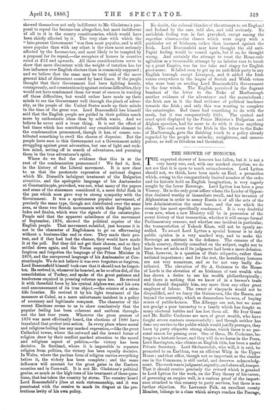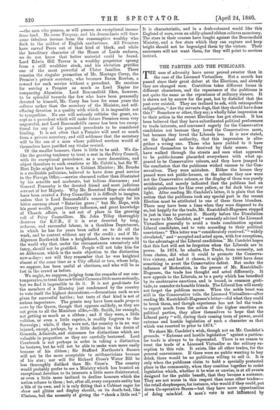THE SHOWER OF HONOURS. T HE expected shower of honours has
fallen, but it is not a very heavy one, and, with one marked exception, we do not see that it is open to much animadversion. Lord Lytton should not, we think, have been made an Earl, a promotion which, owing to the comparatively limited number of the order and its historic hold on English imagination, is very eagerly sought by the lower Baronage. Lord Lytton has been a poor Viceroy. He is the only great officer whom the Leader of Opposi- tion declared worthy of immediate recall, and his invasion of Afghanistan in order to annoy Russia is of all the acts of the late Administration the most base, and the one which the country has most specifically condemned. It is very doubtful even now, when a new Ministry will be in possession of the secret history of that transaction, whether it will escape formal Parliamentary censure, and whether one incident in particular, the transportation of Yakoob Khan, will not be openly an- nulled. To award Lord Lytton a special honour is to defy public opinion in a very marked way, and to make the Sovereign an assistant in the defiance. The censure of the whole country, directly consulted on the subject, ought not to have been set aside as if its judgment had been a mere delusion. That, however, is a question of State etiquette, rather than national importance ; and for the rest, the hereditary honours are not very numerous, and so far not very badly dis- tributed. The elevation of Sir A. Guinness to the House of Lords is the elevation of an Irishman of vast wealth who has shown a desire to use his wealth philanthropically ; and there is nothing that we know of in a brewer's trade which should disqualify him, any more than any other great employer of labour. The owner of vineyards would not be disqualified, and we fancy the Guinnesses, like the Basses, are beyond the necessity, which so demoralises brewers, of buying scores of public-houses. The Allsopps are not, but we must not grudge a poor baronetcy to a family which has fought so many electoral battles and has lost them all. Sir Ivor Guest and Mr. Bairn° Cochrane are men of great wealth, who have fought severe contests unsuccessfully ; and though neither has done any service to the public which would justify peerages, they have by party etiquette strong claims, which there is no per- sonal reason for passing over. One of them, Mr. Cochrane, be- longs to a historic house, and they will do no harm in the Peers.. Lord Barrington, who obtains an English title, has been a useful Private Secretary. Lord Skelmersdale, who will, it is said, be promoted to an Earldom, was an efficient Whip in the Upper House ; and that office, though not so important as the similar one in the Commons, is still useful, and deserves acknowledg- ment. The work wants judgment, sagacity, and above all, temper. That it should receive precisely the reward which is granted to Lord Lytton for the work, on the Tory theory of his career, of governing an empire well, is a curious proof of the import- ance attached in this country to party services, but there is no further objection. Sir Lawrence Palk, an excellent county Member, belongs to a class which always reaches the Peerage, —the men who possess, or will possess, an exceptional income from land. He owns Torquay, and his descendants will draw some fabulous income from the consumptive wealthy who flock to the mildest of English sanitariums. All Premiers have carved Peers out of that kind of block, and while the hereditary character of the House of Lords endures, we do not know that better material could be found. Lord Edwin Hill Trevor is a wealthy proprietor sprung from a still wealthier stock, and his elevation gratifies one of the most powerful of Ulster families. There remains the singular promotion of Mr. Montagu Corry, the Premier's private secretary, who becomes Baron Rowton, a reward for such service without a precedent. He receives for serving a Premier as much as Lord Napier for conquering Abyssinia. Lord Beaconsfield likes, however, to be splendid towards the few who have been personally devoted to himself, Mr. Corry has been for some years the adlatus rather than the secretary of the Minister, and self- effacing devotion is a quality with which it is impossible not to sympathise. No one will seriously criticise the grant, •ex- cept as a precedent which will make future Premiers seem very ungrateful, and Lord Beaconsfield's career has been too excep- tional for any of his personal precedents to be considered binding. It is not often that a Premier will need so much from a private secretary, and still seldomer that the secretary will be the son of a man whose political services would of themselves have justified any titular reward.
Of the smaller honours, there is little to be said. We dis- like the growing tendency to treat a seat in the Privy Council, with its exceptional precedence, as a mere decoration, and object therefore to such creations as Mr. Cubitt's, but Sir W. Hart Dyke might have been a Cabinet Minister; Mr. Bourke is a creditable politician, believed to have done good service in the Foreign Office,—service obscured rather than illustrated by his sensible and moderate, but tedious discourses ; and General Ponsonby is the devoted friend and most judicious servant of her Majesty. Why Mr. Beresford Hope also should have been created a Privy Councillor it is difficult to imagine, unless that is Lord Beaconsfield's concrete apology for his bitter sarcasm about " Batavian grace ;" but Mr. Hope, with his great wealth, great literary influence, and great knowledge of Church affairs, is not out of place in the growing roll of Privy Councillors. Mr. John Tilley thoroughly deserves the K.C.B., if it is ever deserved by long, arduous, and successful labour, in a thankless Department, in which he has for years been called on to do all the work, and be content without any of the credit ; and if Mr. Algernon Borthwick likes a knighthood, there is no reason in the world why that, under the circumstances excessively odd fancy, should not be gratified. People will not take him for an Alderman, which is the main objection to the distinction now-a-days ; nor will they remember that he was knighted almost at the same time as a City official or two, whose help, we suppose, has been useful at elections, and who will be as lost in the crowd as before.
We ought, we suppose, judging from the remarks of our con- temporaries, to treat the new Grand Crosses a little more seriously, but we find it impossible to do it. It is not good-taste for -the members of a Ministry just condemned by the country to vote itself the highest decorations,—decorations such as are given for successful battles ; but taste of that kind is not of serious importance. The grants may have been made proprio utotu by the Queen, though that appears unlikely, as they are not given to all the Ministers alike,—Mr. Smith, for example, not getting so much as a ribbon ; and if they were, a little volition, or even a little caprice, is readily forgiven to the Sovereign ; while, if they were not, the country is in no way injured, except, perhaps, by a little decline in the desire of Generals, Admirals, and statesmen for distinctions which are valuable in proportion as they are carefully bestowed. Lord Cranbrook is not perhaps in order in taking a distinction he bestows, but he will not be able to make wars more easily because of his ribbon ; Sir Stafford Northcote's finance will not be the more acceptable to arithmeticians because of his star ; nor will Sir Richard Cross's Water Bill be less thoroughly disliked than Mr. Cross's. The country would probably prefer to see a Ministry which has boasted an exceptional devotion to its interests a little more disinterested, or even a little more inclined to decline honours which the nation refuses to them ; but, after all, every corporate entity has it life of its own, and it is only fitting that a Cabinet eager for Dhow and glitter and display should, on its death-bed, like Clarissa, feel the necessity of giving the " cheek a little red." It is characteristic, and in a drab-coloured world like this England of ours, even an oddly-placed ribbon relieves monotony. The stars in their courses have fought against the Beaconsfield Ministry, and a few stars which they can capture and keep bright should not be begrudged them by the victors. Their successors will not want them, for they will point to services instead.



































 Previous page
Previous page